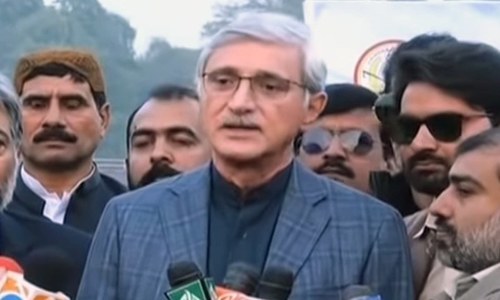ISLAMABAD: Prime Minister Imran Khan on Friday said that a treason case should be initiated against Jamiat Ulema-i-Islam (JUI-F) chief Maulana Fazlur Rehman for his remarks about toppling of the government.
“Maulana Fazlur Rehman had himself said that he had come [to the federal capital to stage a sit-in] to topple the government. Maulana had said that he had been given a signal to topple the government. We want to know who had given him such signals,” Mr Khan said during a chat with journalists at Prime Minister House.
On the other hand, Leader of the Opposition in the National Assembly Shahbaz Sharif has criticised Prime Minister Khan for suggesting institution of a treason case against Maulana Fazl.
Earlier this week, the JUI-F chief said he had ended his Azadi march because he had been given assurances that Prime Minister Khan would step down and elections would be held in three months. He, however, did not say where the assurance came from.
Says Tareen, Khusro not involved in sugar, wheat crises; Shahbaz slams Imran’s statement about JUI-F chief
The JUI-F had staged a 13-day (Nov 1 to 13, 2019) sit-in on Kashmir Road in Islamabad that came to an abrupt end when Maulana Fazl announced that his party was going for ‘Plan B’ — blocking various major roads across the country.
Responding to a question about threat to the PTI government, the prime minister said: “The government will complete its term, it is not going anywhere.”
Sugar, wheat/flour crises
Prime Minister Khan said that Jehangir Tareen, a Pakistan Tehreek-i-Insaf (PTI) stalwart, and Khusro Bakhtiar, federal Minister for Food Security, were not involved in the recent sugar and wheat/flour crises in the country.
He said he had ordered an inquiry into the sugar and wheat/flour shortage and hike in their prices and the report prepared by the Federal Investigation Agency (FIA) had not held Mr Tareen and Mr Bakhtiar responsible for the crisis. “The names of Jahangir Tareen and Khusro Bakhtiar did not crop up in the initial investigation,” he said, adding: “Let’s see how the opposition reacts to this.”
The prime minister said he had rejected the FIA report because it had missed some important aspects and did not answer 20 different questions. “As a result I rejected the report and asked FIA to come up with the fresh one,” he added.
The government critics and opposition have accused both Mr Tareen and Mr Bakhtiar of having been involved in the shortage and increase in prices of sugar and wheat flour in the country, while the prime minister has been defending them.
Mr Khan blamed some “mafia” for the countrywide shortage of wheat and sugar.
He also devolved responsibility of the crisis on the Competition Commission of Pakistan, saying the performance of commission was unsatisfactory. “The issues will not resolve unless this institution will work efficiently. We are trying to improve its performance,” he added.
Biometric voting system
Talking about election rules, Prime Minister Khan said his government intended to bring an important bill to parliament for introduction of a biometric voting system to curb rigging in the general elections so that no loser [political party] could make the whole election system controversial.
About the government decision to replace the Pakistan Medical and Dental Council with the Pakistan Medical Council through an ordinance that was recently struck down by the Islamabad High Court, Mr Khan said the PMDC was not performing its duties. “Rejection of medical degrees of over 5,000 Pakistani doctors by the Saudi authorities was question mark on the performance of the council,” he added.
Answering a question about hike in electricity and gas tariffs, the prime minister assured that their rates would not be increased in the near future. He, however, blamed the last PML-N government for signing costly agreements in the energy sector that caused a surge in circular debt to Rs36 billion per month. “But we have managed to bring it to Rs12bn per month,” he added.
Media criticism
The prime minister claimed that he had endured “media attacks” for the last two years more than anyone else and named two media houses — Dawn and Jang groups — for what he called “publishing false stories” again him and the government.
He asked his media aide Shahbaz Gill to elaborate on it. Mr Gill said there were more than 20 “baseless news” published in Dawn and The News in the recent past.
“Media is an important pillar of democracy and a stakeholder in this age of information and I have never given Saudi Arabia or China’s example with regards to media but always talked about Britain as an example in terms of media. Over there, if any [media house] publishes false news or a false allegation, it is shut down,” the prime minister added.
He lamented that “even his statements were changed” by the media. Specifically, the premier said, “false news” was published about his visit to China due to which he faced a lot of embarrassment in China regarding some reported changes in the China-Pakistan Economic Corridor.
Mr Khan defended the government decision to seek aid from Saudi Arabia, the United Arab Emirates and China, saying Pakistan would have defaulted if they had not helped. He claimed that the country’s economy was now stable and it had been recognised by international watchdogs.
Shahbaz’s reaction
Shahbaz Sharif has lashed out at Prime Minister Khan for seeking a treason trial against Maulana Fazl. “Imran Niazi should have looked into the mirror before giving such a statement,” he said in a statement issued in Lahore on Friday.
The opposition leader said the problem with “chance leaders” was that they would be devoid of knowledge of history. He said Maulana Fazl is the son of a great personality who [along with others] had played a main role in the making of the [1973] Constitution. He said such a statement during the visit of the Turkish president was more regrettable and condemnable.
Published in Dawn, February 15th, 2020















































